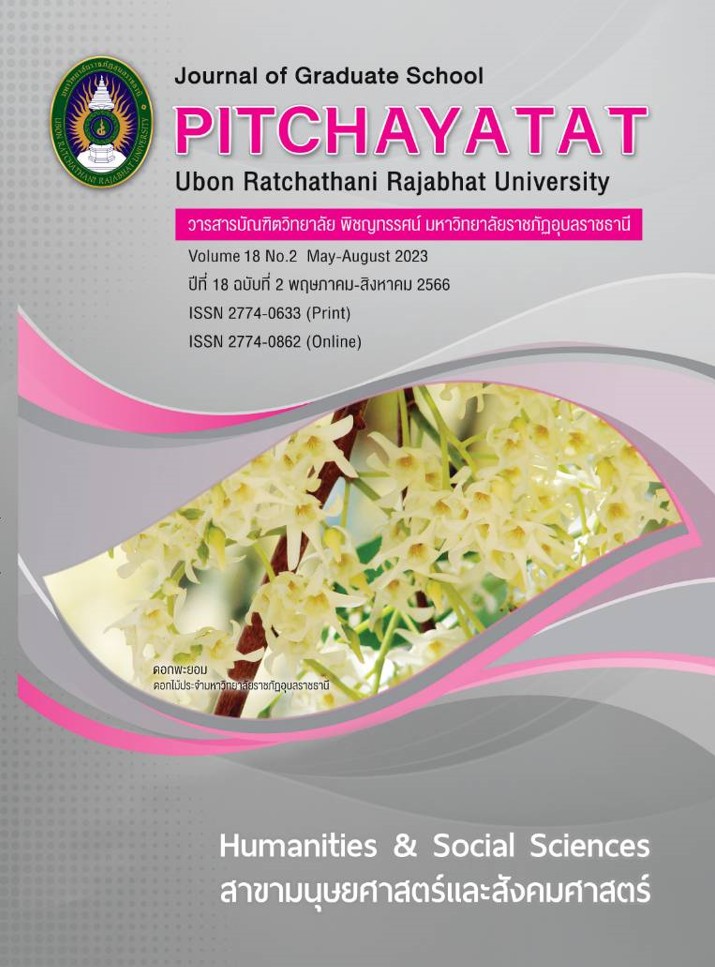สภาพ ความต้องการจำเป็นและแนวทางพัฒนาทักษะสำคัญสำหรับครูในศตวรรษที่ 21 ในสังกัดสำนักงานเขตพื้นที่การศึกษามัธยมศึกษาศรีสะเกษ ยโสธร
คำสำคัญ:
สภาพปัจจุบัน , สภาพที่พึงประสงค์ , การประเมินความต้องการจำเป็น , แนวทางการพัฒนาทักษะสำคัญสำหรับครูในศตวรรษที่ 21บทคัดย่อ
การวิจัยนี้มีวัตถุประสงค์เพื่อ 1) ศึกษาสภาพปัจจุบันและสภาพที่พึงประสงค์การพัฒนาทักษะสำคัญสำหรับครูในศตวรรษที่ 21 ในสังกัดสำนักงานเขตพื้นที่การศึกษามัธยมศึกษาศรีสะเกษ ยโสธร 2) ประเมินความต้องการจำเป็นการพัฒนาทักษะสำคัญสำหรับครูในศตวรรษที่ 21 ในสังกัดสำนักงานเขตพื้นที่การศึกษามัธยมศึกษาศรีสะเกษ ยโสธร 3) พัฒนาแนวทางการพัฒนาทักษะสำคัญสำหรับครูในศตวรรษที่ 21 ในสังกัดสำนักงานเขตพื้นที่การศึกษามัธยมศึกษาศรีสะเกษ ยโสธร ตัวอย่าง ได้แก่ ผู้บริหารสถานศึกษา จำนวน 130 คน และครู จำนวน 350 คน ได้มาโดยวิธีการสุ่มแบบหลายขั้นตอน เครื่องมือที่ใช้ มีจำนวน 4 ฉบับ 1) แบบสอบถามสภาพปัจจุบันทักษะสำคัญสำหรับครูในศตวรรษที่ 21 2) แบบสอบถามสภาพที่พึงประสงค์ทักษะสำคัญสำหรับครูในศตวรรษที่ 21 3) แบบสัมภาษณ์แบบมีโครงสร้าง และ 4) แบบประเมินความเหมาะสมและความเป็นไปได้ของแนวทางการพัฒนาทักษะสำคัญสำหรับครูในศตวรรษที่ 21 สถิติที่ใช้ ได้แก่ ร้อยละ ค่าเฉลี่ย ส่วนเบี่ยงเบนมาตรฐาน และค่าดัชนีลำดับความสำคัญความต้องการจำเป็นแบบปรับปรุง (PNI Modified)
ผลการวิจัยพบว่า
- สภาพปัจจุบันทักษะสำคัญสำหรับครูในศตวรรษที่ 21 โดยรวมอยู่ในระดับมากและสภาพที่พึงประสงค์ทักษะสำคัญสำหรับครูในศตวรรษที่ 21โดยรวมอยู่ในระดับมากที่สุด
- ผลการประเมินความต้องการจำเป็นทักษะสำคัญสำหรับครูในศตวรรษที่ 21 ด้านที่มีค่าสูงกว่าค่าเฉลี่ยโดยรวมเรียงลำดับจากค่าสูงสุดไปค่าต่ำสุด ได้แก่ ด้านทักษะการจัดการเรียนการสอน และทักษะการคิด
- แนวทางการพัฒนาทักษะสำคัญสำหรับครูในศตวรรษที่ 21 มีผลการประเมินแนวทางพัฒนาโดยรวมพบว่า มีความเหมาะสมอยู่ในระดับมากที่สุด และมีความเป็นไปได้ อยู่ในระดับมาก
เอกสารอ้างอิง
เขตพื้นที่การศึกษามัธยมศึกษาศรีสะเกษ ยโสธร, สำนักงาน. สำนักงานเขตพื้นที่การศึกษามัธยมศึกษาศรีสะเกษ
ยโสธร The Secondary Educational Service Area Office Si Sa Ket Yasothon. (ออนไลน์). 2565 (อ้างเมื่อ 9 เมษายน 2565). จาก https://www.secondary28.go.th/.
คณะกรรมการการศึกษาขั้นพื้นฐาน, สำนักงาน. ยุทธศาสตร์ชาติ พ.ศ. 2561-2580. กรุงเทพฯ: สำนักงานคณะกรรมการพัฒนาการเศรษฐกิจและสังคมแห่งชาติ, 2560.
จิรนันท์ นุ่นชูคัน. การประเมินความต้องการจำเป็นในการพัฒนาครูผู้สอนด้านการจัดการเรียนรู้โรงเรียนสังกัด กรุงเทพมหานคร. วิทยานิพนธ์ศึกษาศาสตรมหาบัณฑิต มหาวิทยาลัยสุโขทัยธรรมมาธิราช, 2557.
ณฐวัฒน์ ล่องทอง. การปรับตัวให้เข้ากับการเปลี่ยนแปลงในศตวรรษที่ 21 เพื่อความสุขใจในการทำงาน. เชียงใหม่: คณะมนุษยศาสตร์ มหาวิทยาลัยเชียงใหม่, 2557.
บุญชม ศรีสะอาด. การวิจัยเบื้องต้น. พิมพ์ครั้งที่ 12 ฉบับปรับปรุง. กรุงเทพฯ: สุวรียาสาส์น, 2560.
ปาริชาติ เภสัชชา. การพัฒนาสมรรถนะครูผู้นำด้านการใช้เทคโนโลยีสารสนเทศและการสื่อสารในการจัด กิจกรรมการเรียนรู้ศตวรรษที่ 21. เชียงใหม่: มหาวิทยาลัยราชภัฏเชียงใหม่, 2557.
พจนีย์ มั่งคั่ง และกัญภร เอี่ยมพญา. “แนวทางการพัฒนาทักษะการเรียนรู้ในศตวรรษที่ 21 ของครูโรงเรียน เครือข่ายฝึกประสบการณ์วิชาชีพครู,” มนุษยสังคมปริทัศน์ (มสป.). 22, 1 (มกราคม-มิถุนายน 2563): 116-128.
พรทิพย์ ศิริภัทราชัย. “STEM Education กับการพัฒนาทักษะในศตวรรษที่ 21,” วารสารนักบริหาร. 33, 2 (เมษายน-มิถุนายน 2556): 49-56.
มานะ แม่เขียว. การศึกษาบทบาทหน้าที่ของครูในการจัดการเรียนการสอนในศตวรรษที่ 21 ของ โรงเรียนสังกัด องค์การบริหารส่วนจังหวัดชัยภูมิ. วิทยานิพนธ์ครุศาสตรมหาบัณฑิต มหาวิทยาลัยราชภัฏชัยภูมิ, 2561.
เลขาธิการสภาการศึกษา, สำนักงาน. แนวทางการพัฒนาการศึกษาไทยกับการเตรียมความพร้อม สู่ศตวรรษที่ 21. กรุงเทพฯ: สำนักงานเลขาธิการสภาการศึกษา, 2557.
เลขาธิการสภาการศึกษา, สำนักงาน. สภาวะการศึกษาไทยปี 2557/2558 จะปฏิรูปการศึกษาไทยให้ทันโลกศตวรรษที่ 21 ได้อย่างไร. กรุงเทพฯ: พิมพ์ดีการพิมพ์, 2559.
วาสนา ศรีปรัชญาอนันต์. ทักษะแห่งศตวรรษที่ 21: มายาคติในการศึกษาไทย. (ออนไลน์). 2563 (อ้างเมื่อ 10 มกราคม 2566). จาก https://www.leadershipforfuture.com/21century-skills-research/
วิจารณ์ พานิช. วิถีสร้างการเรียนรู้เพื่อศิษย์ ในศตวรรษที่ 21. กรุงเทพฯ: ตถาดา พับลิเคชั่น, 2556.
สุริยาพร นพกรเศรษฐกุล. ทักษะการจัดการเรียนรู้ในศตวรรษที่ 21 ของครูโรงเรียนมัธยมศึกษา จังหวัดระยอง สังกัดสำนักงานเขตพื้นที่การศึกษามัธยมศึกษาเขต 18. ชลบุรี: มหาวิทยาลัยบูรพา, 2561.
สุวิมล ว่องวาณิช. การวิจัยประเมินความต้องการจำเป็น. กรุงเทพฯ: สำนักพิมพ์แห่งจุฬาลงกรณ์มหาวิทยาลัย, 2558.
Kereluik R., K. etal. “Teacher knowledge for 21st century,” Journal of Digital Learning in Teacher Education. 2013, 14. (June 2013): 127-140.
Krejcie, and D.W. Morgan, “Determining sample size for research activities,” Educational and Psychological Measurement. 30, 3 (August 1970): 607-610.
Sahin, M C. “Instructional Design Principles for 21st Century Learning Skills,” Procedia - Social and Behavioral Sciences. 1, 1 (January 2009): 1464-1468.
ดาวน์โหลด
เผยแพร่แล้ว
รูปแบบการอ้างอิง
ฉบับ
ประเภทบทความ
สัญญาอนุญาต
ลิขสิทธิ์ (c) 2023 วารสารบัณฑิตวิทยาลัย พิชญทรรศน์ มหาวิทยาลัยราชภัฏอุบลราชธานี

อนุญาตภายใต้เงื่อนไข Creative Commons Attribution-NonCommercial-NoDerivatives 4.0 International License.
บทความทุกเรื่องได้รับการตรวจความถูกต้องทางวิชาการโดยผู้ทรงคุณวุฒิภายนอกอย่างน้อย 3 คน ความคิดเห็นในวารสารพิชญทรรศน์เป็นความคิดเห็นของผู้นิพนธ์มิใช่ความคิดเห็นของผู้จัดทำ จึงมิใช่ความรับผิดชอบของวารสารพิชญทรรศน์ และบทความในวารสารพิชญทรรศน์สงวนสิทธิ์ตามกฎหมายไทย การจะนำไปเผยแพร่ต้องได้รับอนุญาตเป็นลายลักษณ์อักษรจากกองบรรณาธิการ





